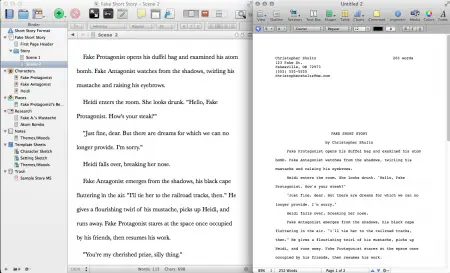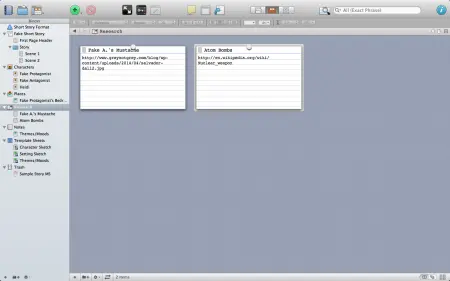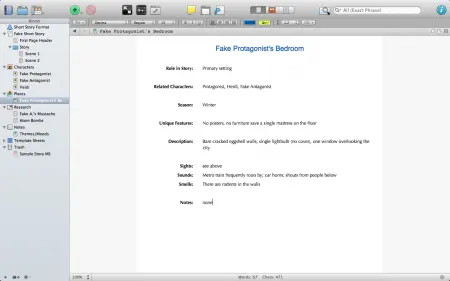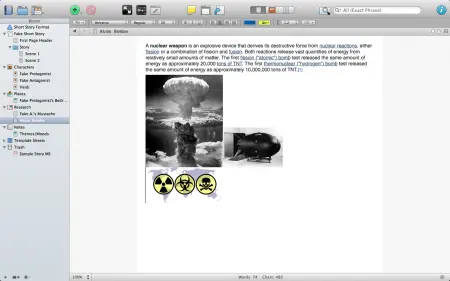We writers have multiple word processing options at our disposal, with perhaps the most prominent being Microsoft Word and Apple Pages for prose fiction, and Final Draft and Celtx for screenwriting. Both these and other software work quite well, particularly if you've already built up a collection of templates with standard manuscript formatting in place. Of course, the beauty of screenwriting applications like the ones mentioned above is that the program takes on the drudgery of formatting, letting you focus solely on the writing; this is because software like Final Draft and Celtx are dedicated to their mediums, rather than multi-purpose word processors that can more or less handle several creative writing platforms.
Now, imagine a piece of software that is both multi-platform and rigorously dedicated to the formatting specifics of each medium, and you will have a pretty solid understanding of what Scrivener, the award-winning "writer's writing software," is all about. Simply put, whether you're a screenwriter, a playwright, a graphic novelist, a prose fiction author, or all of the above, Scrivener is your one-stop shop for all your writerly needs. Best of all, the program really, really works.
Admittedly, I've known about Scrivener for some time, but I never really explored it until now. I actually purchased it several years ago, and since that time it's sat dormant on my computer. My awareness of it was piqued once again when a friend began religiously singing its praises to me, and when I read this interview we ran last month with John Hornor Jacobs (conducted by Keith Rawson), in which the author identified Scrivener as his word processor of choice.
Revisiting the software, I remembered that my reasons for avoiding any kind of total immersion into Scrivener were: one, there's a slight learning curve to it, and I didn't feel I had the time to manage that; and two, I'd already established a workflow with Pages. Now, I see my fear of learning something new was just that, fear, and that my previous workflow was pretty clunky in comparison. I'm not knocking Pages in anyway—or any other word processor, for that matter—and I still use it for article writing (I'm drafting this review on it right now!). It's just that, even with my "short story" template set to standard manuscript formatting, exporting to different file types for submission has always presented a handful of problems and errors, and this is true of any platform, be it Pages, Word, Open Office, etc.
This was the first thing that blew me away about Scrivener: like those aforementioned screenwriting applications, all standard manuscript formatting is handled during the export (or, as Scrivener's developers term it, "Compile") process. So, if you prefer writing with an 18 point Baskerville font, as I do, you don't have to worry about later changing it to Courier 12 point. Scrivener takes care of that. You don't have to worry about the spacing between your name/contact info and the title of your story. You don't have to worry about your word count being inexplicably moved to the line below your name (a malady I detailed in a previous column). Your headers won't fly off track. Everything you write will magically turn into a perfectly formatted, ready-to-submit document, because Scrivener takes care of it all. Check out this side by side comparison between Scrivener's interface and the exported DOC that I opened in Pages:
Furthermore, in addition to the expected file types (.doc, .docx, .rtf, .pdf, etc.), Scrivener will also compile your stories/novels into eBooks, deftly handling both Mobi (Kindle's format) and ePub (an open-ended format most notably used by Apple's iBooks). Which of course means if you're a self-publisher, your days of tedious formatting and file conversions are over.
And there's even more. Scrivener is so feature-rich, it's doubtful you'll ever use them all. But that's the beauty of the software: it can be tailored just to your liking. You can wholly immerse yourself in the various functions, or you can use the basic features. Either way, Scrivener works for you, not against you.
About Scrivener
I'll talk a bit more about the extended features in a moment. But first, a little about the company behind Scrivener, Literature & Latte, straight from the mouth of its founder and lead Mac developer, Keith Blount (via L&L's About page):
Literature & Latte was founded in 2006 with the sole purpose of creating software that aids in the creative process of writing long texts...[W]e are now a (very) small team working to make Scrivener the best solution for writers of all disciplines for structuring and writing first drafts.
Blount adds that his team is "small in size, not stature," reemphasizing L&L's commitment to their product. He also states that Scrivener's genesis was born out of his own goal of writing a novel, and feeling frustrated by the available software at the time:
I was just a guy with lofty writerly ambitions...I developed Scrivener because I felt I needed a tool to help me really get a grip on my writing, notes and research, to organise it and start putting it all together like a jigsaw...
So, not only is Scrivener made for writers, it's made by writers as well. And, again, it really works. Trifecta!
Using Scrivener
As Blount states, the software is quite intuitive. That being said, you may want to familiarize yourself with L&L's video tutorial page, which features a wealth of helpful information. Here's a link to the primary introductory video; at about ten minutes, needless to say, it's fairly comprehensive.
Since Scrivener deals with numerous mediums, to start a project, you must choose a template. If you're writing fiction, as previously mentioned, your choices of font and spacing are left open to personal taste. If you're a screenwriter, Scrivener utilizes the industry-standard interface, so there's no learning curve if you're coming from Final Draft, Celtx, or another comparable program. Regardless of medium, you're able to split your scenes into separate "documents" that are organized within the main project folder, which you can rearrange via a "Corkboard," or via the "Binder" pane on the left side of the main window (see photo below). Note too that if you're working on a novel, you can further break up the story into chapters or even parts.
Everything about Scrivener is customizable. My Binder and the overall layout you see above isn't too far off from the standard Short Story template, with the added modifications of a "Notes" folder and a "Themes/Moods" check sheet, which I based off of the Character sheet provided by the developers (see below). The latter sheet template helped me to reconnect with one of my stories. In filling out the information, I remembered the main objective of my protagonist, what was driving him to make particular decisions and behave in certain ways. It seems an obvious thing to do—delving back into character to regain enthusiasm for a project—but it was only by working with a check sheet that I was able to get to this point. These sheets are now an integral part of my workflow.
Now, let's talk about those "notes and research" features I alluded to earlier. Like the character, setting, and themes/moods check sheets, this aspect of Scrivener has changed my entire writing process for the better. It used to be, if I had a story that required some initial research, I would save said items (photos, links, scraps of text from Wikipedia and other articles, etc.) in a separate document. Invariably, I would close this file and forget about it, only to stumble upon it long after my story was completed, and wonder why I never included a particular interesting fact in the work itself. But with Scrivener, all that research is housed within the project Binder, readily accessible and visible, so I won't forget about it. This is especially handy since, sometimes, I compile heaps of research long before I ever sit down to write the story, which, when working in Scrivener, requires me to make a brand-new project file. The photos, text and whatnot get saved here, and when I eventually come back to work on the story, all I have to do is go back over my research, then click the Story folder, make a new scene, and start writing.
Again, the examples I've provided demonstrate how I use Scrivener, but that may not be the way you use Scrivener. Blount states that his software was never meant to be "all things to all writers," but because of its rather elastic interface, I feel Scrivener actually achieves this goal. From basic functionality and beautiful formatting to expansive research, note-taking, and mapping capabilities, Scrivener is sure to please just about any writer, regardless of medium.
Where To Buy
Scrivener can be purchased directly from Literature & Latte's webpage. It costs $45 for Mac, $40 for Windows (student discounts are also available). If you'd like to try it out first, there's a 30-day trial available here. What's awesome about this is, the trial is not date-stamped and lasts for 30 days of actual use—so if you play around with Scrivener for a day, then forget about it for a month, when you come back you still have 29 days of use left. Pretty neat, huh?
For those of you wondering if Scrivener has any presence on mobile devices, the answer, as of right now, is no. But, the developers are hard at work on an iOS version for iPhone and iPad, and you can read about the app's current status here. In the meantime, there is a work-around for those wanting a mobile option for on-the-go writing, and it's super easy. Check out this video tutorial for more details.
Finally, if you're interested in brainstorming/idea-mapping software, check out L&L's sister product Scapple. I have no hands-on experience with this one, mainly because I don't really pre-plot, but the interface looks pretty cool.
Who else out there in LitReactor land is in love with Scrivener? I personally found zero things to dislike about it, but do you have any objections to the software? If not Scrivener, then what's your word processor of choice, and why?
As always, if there's a writerly product out there you'd like to see reviewed, send an email to tech@litreactor.com with a link to the item in question.

About the author
Christopher Shultz writes plays and fiction. His works have appeared at The Inkwell Theatre's Playwrights' Night, and in Pseudopod, Unnerving Magazine, Apex Magazine, freeze frame flash fiction and Grievous Angel, among other places. He has also contributed columns on books and film at LitReactor, The Cinematropolis, and Tor.com. Christopher currently lives in Oklahoma City. More info at christophershultz.com












